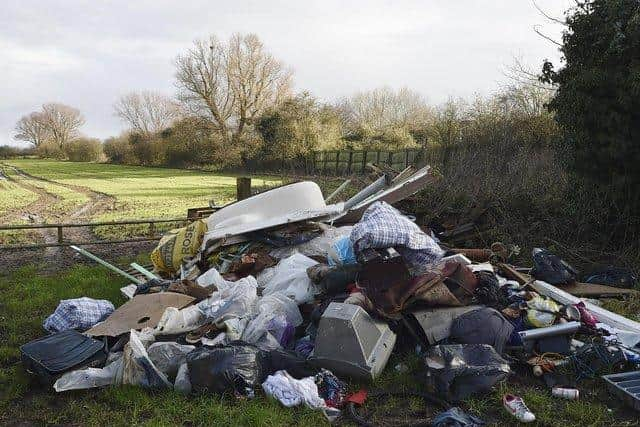Hertfordshire waste chiefs set to lead calls for tougher sanctions for fly tipping
and live on Freeview channel 276
Waste chiefs from across Hertfordshire are spear-heading national calls for tougher sanctions for fly-tipping – as latest data shows an increase in fly-tipping across the county.
Last year (2020/21) there were almost 18,000 incidents of fly-tipping recorded in Hertfordshire – equivalent to 1500 every month – costing in excess of £1.2m to clean-up.
Advertisement
Hide AdAdvertisement
Hide AdDuring that time 129 fixed penalty notices – of up to £400 – were issued by district and borough councils in Hertfordshire. And there were 24 court prosecutions – with average fines of £297.


But according to the Hertfordshire Waste Partnership – which includes representatives from the 11 Hertfordshire councils – the deterrent needs to be greater.
And now – with the backing of more than 136 local authorities – they are set to write to the sentencing council to ask for tougher sentences for fly-tipping.
They want court fines to EXCEED fixed penalty notices – and they want those who cannot pay the fines to serve a community service, that could include the clearing of fly-tips or litter.
Advertisement
Hide AdAdvertisement
Hide AdThey also point to the use of suspended sentences as an effective deterrent to re-offending – and suggest that for anyone convicted of fly-tipping for a second time the sentence should not be suspended.
The letter is expected to be sent to the Sentencing Council, at the Royal Courts of Justice, today (Monday, August 2).
But a draft of the letter was presented to a meeting of the Hertfordshire Waste Partnership on Monday, July 26.
And after the meeting, the county council’s executive member for the environment Cllr Eric Buckmaster – who is chair of the Hertfordshire Waste Partnership – welcomed the support from around the country.
Advertisement
Hide AdAdvertisement
Hide Ad“I think it’s a pragmatic thing to do – and I am really pleased with the level of support coming from around the country.
“It’s important to do whatever we can to deter fly-tipping through having appropriate sentences […] and not giving the option for people to wriggle out of their responsibilities.
The letter – due to be sent on Monday – points to the “significant challenges” relating to sentences handed down by the courts.
And it suggests that the ‘sentences handed down do not always match the severity of the offence committed’.
Advertisement
Hide AdAdvertisement
Hide AdIt says fines issued by the courts are below the level of the fixed penalty notice – pointing to average fines in Hertfordshire of £341 in 2018/19 and £365 in 2019/20.
It says court fines should exceed the £400 fixed penalty maximum.
It suggests a fine of around £3000 – equivalent to six week’s average earnings – would be ‘very welcome’ and would ‘go some way to restoring public confidence’.
It points to anecdotal evidence suggesting that solicitors are advising clients to go to court, because – it says – they are aware the fines are often lower than the fixed penalty notices.
Advertisement
Hide AdAdvertisement
Hide AdAnd it says: “. . . if a defendant chooses to go to court as is their right, then we believe it is only reasonable that the potential consequences of such a choice are considered.”
Meanwhile the letter also calls for courts to look more closely at a defendant’s ability to pay, when determining the fine .
It calls for the courts to ‘undertake robust checks of means declarations’ – pointing to defendants who declare low official incomes, but benefit from large undeclared sums, that can be gained through fly-tipping.
And they also suggest the courts are currently ‘unwilling’ to pursue non payment of fly-tipping fines because the cost of doing so outweighs the fine and costs involved – suggesting they can “often look ‘soft’ on fly tipping”.
Advertisement
Hide AdAdvertisement
Hide AdWhere a fine is not possible the letter suggests sentencing could include community service – which, they say, could focus on clearing fly-tips and litter.
And it suggests that as well as sending a clear message about the willingness of the courts to seek redress from defendants, it would lead to a perception that going to court is unlikely to be seen as a better option.
